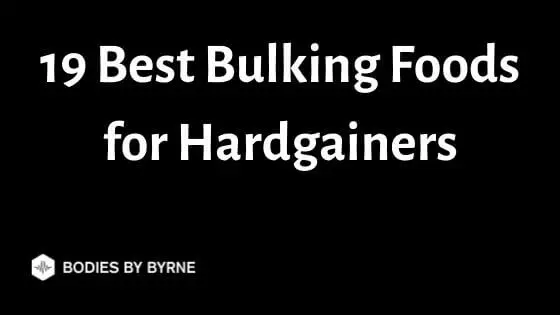Selecting the right food choices when bulking as a hardgainer is essential to see muscle growth and ultimately an increase in size.
Basics of Bulking
When bulking (especially as a hardgainer) you need to make sure that you are in a calorie surplus on a daily basis. This means first working out what your maintenance calorie requirements are just to maintain weight and then adding 300kcal – 500kcal on top of this surplus.
If you need a starting place to work out what your calorie requirements should be on a bulk then you can check out my dedicated article to it:
Once you have this daily calorie target in place then the next challenge is actually consuming the amount of calories that you need in terms of nutrient dense foods.
There is no denying that you could eat 20 donuts per day and this will guarantee that you hit your daily calorie targets however the issue is that this approach will not benefit your physique what so ever!
In order to make the most out of a bulk you need a good macronutrient split and should be getting the majority of your calories from nutrient dense wholefoods. This is the approach that will build a physique and accelerate muscle growth whilst minimizing fat gain.
For this reason I’ve put together this short guide that highlight all the best bulking foods for hardgainers, there are 19 in total covering all the key macronutrient groups and if you make up the majority of you diet with these foods then the results in your training and physique will still follow.
Don’t forget that when applying this you need to hit your calorie surplus for the day, this is absolutely crucial for a hardgainer so just make sure this box is checked before you persevere with minimal results to show for your hard work!
Related – Best bulking snacks
Best Bulking Food for Hardgainers – Protein
Protein is the building block of your muscles and therefore when weight training it is essential that you consume enough protein to facilitate muscle recovery and growth.
On average you should be looking to consume 1g of protein per 1lb of body weight, therefore if you are starting out as a hardgainer weighing 150lbs then you need to consume 150g of protein per day. This is a guideline amount so follow this if you are just getting started.
To get this you need to be consuming some good quality food sources that have a varied amino acid profile (amino acids are the building blocks of protein) and therefore it’s best to cycle your protein sources to keep variety high.
1. Red Meat
Red meat is a high calorie, high protein food source that is also rich in vitamins. An excellent choice to consider is grass fed beef.
Typical nutritional information for a grilled beef tenderloin steak is:
Per 85g steak
Calories – 179kcal
Protein – 26g
Carbohydrate – 0g
Fat – 7.6g
** Data pulled from USDA at verywellfit
2. Chicken Breast
Though chicken breast is lower in calories than red meat it is still an excellent bulking food because of how versatile it is for cooking. It’s the classic bodybuilding staple whether you are bulking or cutting and can be bought very cheap when buying in bulk.
Typical nutritional information for chicken breast is:
Per 100g skinless, boneless breast
Calories – 165kcal
Protein – 31g
Carbohydrate – 0g
Fat – 0g
** Data pulled from nutritiondata
3. Eggs
Eggs are an absolute powerhouse when it comes to protein sources on a bulk. Eggs are a complete protein meaning that they have a protein profile that has all the essential amino acids present. They are also a good source of fats and leading coaches like Charles Poliquin advocate a breakfast of steak and eggs.
Typical nutritional information for eggs is:
Per boiled egg
Calories – 75kcal
Protein – 7g
Carbohydrate – 0g
Fat – 5g
** Data pulled from webmd
4. Oily Fish
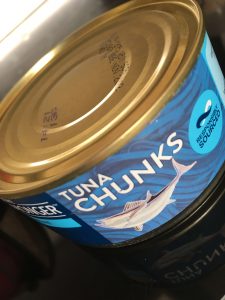
Oily fish is certain types of fish that are rich in omega 3 fatty acids, these have a great protein profile whilst also providing immune system boosts and a benefit to the cardiovascular system. Good examples of oily fish are salmon, mackerel, sardines, herring and tuna.
Typical nutrition information for oily fish is:
Per 85g Salmon
Calories – 121
Protein – 17g
Carbohydrate – 0g
Fat – 5.4g
** Data pulled from verywellfit
5. Whey Protein
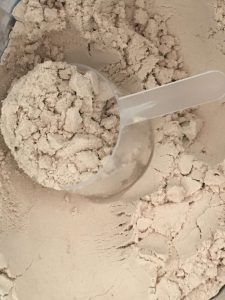
Whey protein is one of my exceptions on this list in terms of wholefood sources. Whey protein is a powdered protein supplement that is excellent at upping your daily protein intake.
Consuming 1g per 1lb of body weight can be a challenging task and supplementing with whey protein is an excellent way to hit this daily goal.
Typical nutrition information for whey protein is:
Per 25g serving
Calories – 103kcal
Protein – 21g
Carbohydrate – 0g
Fat – 1.9g
** Data pulled from myprotein
6. Nuts
Nuts are nature’s protein powerhouses. A handful of nuts per day is a great way to add up to 200kcals to your daily intake, when it comes to bulking you won’t do much better for a snack than consuming a handful of nuts.
It’s worth noting that nuts are high in fats, many items in these food choices have macronutrient crossover which makes them excellent bulking goods. I’ve included them in protein simply for the snack component.
Typical nutritional information for nuts is:
Per 28g of mixed nuts
Calories – 173kcal
Protein – 5g
Carbohydrate – 6g
Fat – 16g
** Data pulled from healthline
7. Beans & Lentils
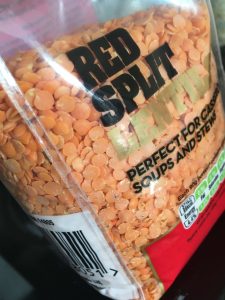
Much like nuts, beans and lentils are another great source of protein that you wouldn’t have considered and are a key source for those following a plant based diet.
These are also a versatile food choice that can go well with carb sources like rice so can be cooked in bulk and prepped to save cooking time which is essential on a bulk.
Typical nutritional information for beans is:
Per 130g mixed beans
Calories – 80kcal
Protein – 5g
Carbohydrate – 18g
Fat – 0g
** Data pulled from calorieking
Best Bulking Food for Hardgainers – Carbohydrates
Carbohydrates are essential when it comes to hardgainers on a bulk, typically due to a quicker metabolism you will be able to consume a higher quantity without the negative impact of excessive fat gain.
Carbs are converted to muscle glycogen which fuel your muscles for workouts and then replenish it again post workout so this is one area that you should not skip on when it comes to a bulking phase.
8. White Rice
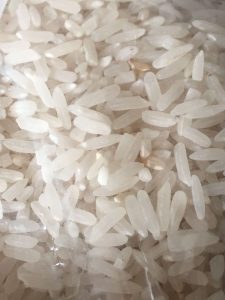
White rice is a staple carb source for bulking and because it’s a high glycemic index food it means it will be quickly digested and absorbed into the bloodstream.
The reason this is essential on a bulk is because at some stage you will struggle with appetite due to having a full stomach, a quick digesting carb source will therefore help to alleviate this issue. Rice is also a versatile carb source that can go with a range of meals so again it’s easy to bulk cook in prep.
Typical nutritional information for white rice is:
Per 100g white rice
Calories – 123kcal
Protein – 2.9g
Carbohydrate – 30g
Fat – 0g
** Data pulled from healthline
9. Potatoes (Sweet or White)
Potatoes are another excellent and versatile bulking carb source, they are easy to cook, cheap and can go with numerous meals depending on the cooking method used.
The cooking method will also influence the glycemic index, many say sweet potato is better due to a more favorable glycemic index score however, the cooking method can be manipulated to mean that there is virtually no difference between a white potato or sweet potato.
Therefore choose whichever you prefer based on taste.
Typical nutritional information for a white potato is:
Per 173g medium potato baked with skin
Calories – 161kcal
Protein – 4.3g
Carbohydrate – 36.6g
Fat – 0.2g
** Data pulled from healthline
10. Oats
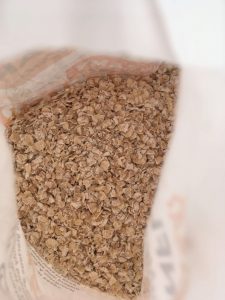
The main reason why I like oats as a carb source is because it’s obviously a good choice as a staple breakfast however it’s also easily blended into a high calorie shake.
Instead of wasting money on a mass gaining shake you can make your own with a base of oats and whey protein and then add any other ingredient that you want in order to up the calories.
Typical nutritional information for oats is:
Per 100g rolled oats
Calories – 379kcal
Protein – 13g
Carbohydrate – 67g
Fat – 6g
** Data pulled from wikipedia
11. Pasta
Pasta is a debatable inclusion on this list, personally I prefer rice and potatoes over the wheat option just because they sit easier on the stomach during a bulk, however that’s not to say that pasta isn’t a great bulking option.
Pasta goes great with a range of sauces and can help keep your taste buds and appetite active when it might not necessarily be the highest on a bulk.
Typical nutritional information for pasta is:
Per 1 cup whole wheat spaghetti
Calories – 174kcal
Protein – 7.5g
Carbohydrate – 37g
Fat – 0.8g
** Data pulled from healthline
12. Honey

Honey is a more nutrient dense bulking food source to use as a sweetener in place of sugar. This goes great with morning oats as a sweetener to a high calorie shake and is a great addition to up daily calorie intake without being heavy on the stomach.
As you’ll see from the nutritional information, honey is low in other macronutrient categories other than carbs so should really be used in place of a sweetener to up your daily calories.
Typical nutritional information for honey is:
Per 21g honey
Calories – 64kcal
Protein – 0g
Carbohydrate – 17g
Fat – 0g
** Data pulled from verywellfit
13. Berries
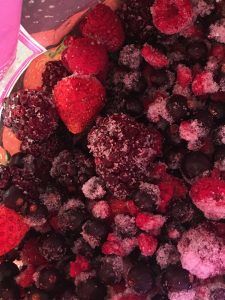
Berries are included in this list because they are high in natural sugars through fructose but also high in antioxidants and vitamins. When on a bulk it’s easy to get caught up in your macronutrients and forget about your micronutrient intake.
When consuming wholefoods you’ll hopefully be covering these bases but it will only benefit to add fruits and berries into your diet just to ensure you are consuming the optimal level of nutrients.
Berries much like honey are an excellent addition to your oat or homemade shakes in order to add natural flavoring in place of artificial sweeteners.
Berries have trace amounts when it comes to macronutrients so I won’t list them below however it’s worth knowing that they are powerhouses when it comes to vitamins and micronutrients!
14. Vegetables
Vegetables are high in fiber and therefore sit in your stomach for a long time as they are hard to break down and digest, this leads to feeling fuller for longer which is far from ideal on a bulk.
For the same reasons just outlined with berries you should still be including them in your diet for the micronutrient benefit that you will receive from them. Leafy green veg like spinach and kale are considered to be two of the best power foods a human can consume due to the nutrient density.
For this reason you shouldn’t be skipping your greens in fear of feeling full as you’ll be full on a bulk regardless!
You’ll notice that the nutritional rating for carbs is nil, this is because the dietary fiber is so high that your body uses that energy just to break it down however vegetables are considered to be a carb source in terms of categorizing
Typical nutritional information for vegetables is:
Per cup raw spinach
Calories – 7kcal
Protein – 0.8g
Carbohydrate – 0g
Fat – 0g
** Data pulled from medicalnewstoday
15. Bagels
The only form of ‘bread’ that I’d recommend to a hardgainer on a bulk is in the form of bagels and that is simply because they offer a better nutrient profile than standard bread.
Typical nutritional information for bagels is:
Per 105g medium bagel
Calories – 289kcal
Protein – 11g
Carbohydrate – 56g
Fat – 2g
** Data pulled from healthline
Best Bulking Food for Hardgainers – Fats
Fats are often a neglected part of the bulking process however they are essential for providing hormonal balance. Many of the natural muscle building processes are controlled by hormonal responses.
Testosterone is one of the active hormones that contributes to muscle growth. With this in mind it’s important to consume adequate fats on your bulk just to control hormonal balance whilst training heavy.
For a hardgainer it’s also important to note that 1g of fat will have 9 calories, protein and carbohydrates in comparison only have 4 calories per 1g and therefore foods high in fat are great for bulking, especially if consuming a lot of calories is something that you struggle with.
16. Coconut & Olive Oil
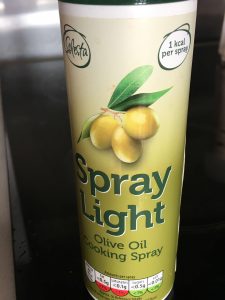
Cooking in oils and adding them to your food is a great way to up the calorie content of a meal without necessarily adding a wholefood source.
When cooking with oil some of the calories will be burned off in the cooking process so the better route to take is to add the oil straight to the meal once it’s already cooked and this way you will preserve the calories.
Typical nutritional information for oils is:
Per tablespoon of olive oil
Calories – 119kcal
Protein – 0g
Carbohydrate – 0g
Fat – 13.5g
** Data pulled from everydayhealth
17. Nut Butters
I’ve mentioned that nuts are a great snack however when you want to add a fat source to a meal then nut butters are much more versatile.
These can be added to shakes, oats or on a bagel and when compared with nuts, a nut butter comes in much cheaper.
Typical nutritional information for nut butter is:
Per 32g peanut butter
Calories – 190kcal
Protein – 7g
Carbohydrate – 8g
Fat – 16g
** Data pulled from verywellfit
18. Avocado
Avocados have burst into popularity in recent years, particularly with the shift towards vegetarian and vegan based diets (whether or not this is a fad is yet to be seen).
Despite the sudden increase in popularity, avocados have always been an excellent source of natural fats within a diet.
Typical nutritional information for avocados is:
Per 50g
Calories – 80kcal
Protein – 1g
Carbohydrate – 4g
Fat – 8g
** Data pulled from californiaavocado
19. Dairy (Milk, Cheese, Cream)
Dairy, much like some other food choices on this list, is actually balanced in terms of macronutrients; however when looking for fat rich foods on a bulk there are certain dairy products that satisfy this need.
Cream for example is a high fat dairy option that is also easy to add to your morning coffee to even up the calories there (bulking hack 101).
Dairy is also obviously a very versatile option depending on what your preference is and is a great source of calcium as well.
Typical nutritional information for dairy products is:
Per 240ml whole milk
Calories – 149kcal
Protein – 7.7g
Carbohydrate – 11.7g
Fat – 8g
** Data pulled from healthline
